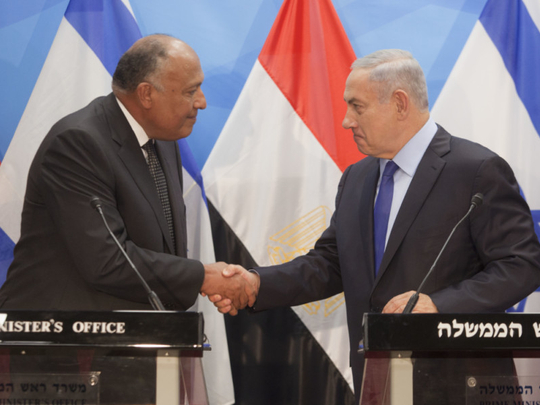
The visit by the Egyptian Minister of Foreign Affairs, Sameh Shoukry, was an attempt to break the obstacles that Israel has placed before the peace process, said UAE’s Al Khaleej. “Israel has impeded the peace process with its racist, expansive plans that are designed to continue and expand the Judaisation process. It has also rejected any efforts for settlements that can help realise a minimum of Palestinian national rights. Shoukry’s visit was an attempt to convince Israel to abandon its stance that rejects any solution for establishing a Palestinian state. A statement issued by Israeli Prime Minister Benjamin Netanyahu, following the meeting, shows that Israel’s stance has not changed, which means that it rejects a return to negotiations or any timeline that ends with the establishment of a Palestinian state. It seems that Netanyahu wants to contemplate holding negotiations similar to those held in the past, which lasted for 20 years under US sponsorship and had disastrous results for the Palestinian cause.”
Shoukry’s visit complements Egypt’s desire to end the suffering of the Palestinian people, who have become the victims of crises in the Arab world, which has diverted attention from the Palestinian issue, said Egypt’s Al Ahram. “Egypt makes immense effort to try to regain the rights of Palestinians, not merely as part of its national duty, but also due to the strategic position imposed on it as a leading nation that bears the responsibility of confronting the dangers facing Arabs. Some have said that Shoukry’s visit to Tel Aviv and his meeting with Netanyahu are part of preparations on the regional level, following the resumption of Israeli-Turkish relations and Netanyahu’s recent tour to Africa, but anyone who has read Shoukry’s statement following the meeting will definitely understand that Egypt’s goal is working on resuming the frozen peace process,” the paper said.
Meanwhile, following the release of the long-awaited Chilcot Report last week, which investigated Britain’s role in the invasion of Iraq — the verdict is clear: Tony Blair is guilty as charged, said Lebanon’s Daily Star. “Thanks to this, we have a clear picture of where Britain went wrong and why: Spun intelligence, blind support of an [American] Republican president, total disregard for the consequences of such an intervention and the deceit of a nation. And who will pay for the dismantling of a country that, regardless of the malfunction of Saddam Hussain, was once economically self-sufficient and which boasted an affluent, diverse society sporting an educated elite? Blair, in his audacity, apologises for only some of his “mistakes” and says he would do it all again today. But time will tell if Blair’s half-baked apology will be enough for the International Criminal Court.”
The full extent of Blair’s deception has been laid bare in the 2.5 million-word Chilcot report into the truth behind the Iraq war and the subsequent debacle, said the Saudi Gazette. “The exposure of his deceptions, when no WMDs [weapons of mass destruction] were found and when Iraq descended into chaos made Blair a toxic politician. Yet, largely at America’s insistence, he was made special envoy for the Middle East Quartet, a job he held without success for eight years.”





_resources1_16a31069e4e_small.jpg)




